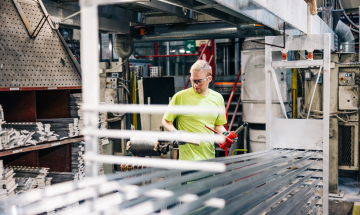Finland fails to join the market pull in Western Europe
Technology industry companies received fewer new orders in July–September. Order books were, however, somewhat strengthened due to orders for ships. The deliveries of ships will be scheduled for the coming years, to be completed by 2020. If the orders for ships are disregarded, new orders received by the other technology companies remain at the same level as in 2009.
The companies that took part in the Federation of Finnish Technology Industries’ survey of order books reported that the monetary value of new orders between July and September was 20 per cent lower than in the previous year and in the preceding quarter in April–June.
At the end of September, the value of order books was 11 per cent greater than at the same time in 2014, and four cent above the value reported at the end of June. Of the respondents, 60 per cent said their order books had declined in size since June, while 30 per cent said they had grown, and 10 per cent said they remained stable.
In January–July, the turnover of technology industry companies was 3 per cent higher than in the corresponding period for 2014. In 2014, the turnover amounted to 67 billion. It is still approximately twenty billion below the level of 2008, the peak year.
“Judging from order trends in recent months, the turnover of the technology industry is expected to remain at the same level in late 2015 as in the corresponding period last year,” says Jorma Turunen CEO of the Federation of Finnish Technology Industries.
Turunen is encouraging the government promptly to implement those points in the government programme that support growth.
Companies do recruit, even in the face of a difficult situation
Between January and September, the number of personnel employed by Finnish technology industry companies in Finland saw a slight year-on-year decrease. At the end of September, the industry had about 2,000 fewer employees than last year. On average, the industry had 282,000 employees.
“Despite the reductions, technology industry companies have recruited a total of almost 22,000 new employees in 2015. Between July and September, the number of recruitments amounted to 7,700. Some companies were increasing their personnel, while others were hiring new employees due to retirements and employee turnover,“ Turunen comments.
Company specificity provides a competitive edge
Terms of employment specific for a company create a competitive edge. Such terms help to create better productivity and improved profitability, enhanced well-being at work and they also add to flexibility.
“Inflexible and restrictive regulation is a poor recipe for modern economy. Companies must be able to operate under conditions that are defined by the customer. This requires flexibility and an ability to react promptly to customers’ needs,” says Eeva-Liisa Inkeroinen, Director, Labour Market, at the Federation of Finnish Technology.
Consequently, increasing company-level solutions is a new trend in the labour market. Salary, working hours and the management of absenteeism are issues best resolved at the company level.
“Salary is an investment, not an item of expenditure,” Inkeroinen says, emphasising this point.
When the salary system is based on a company’s strategy and business targets, it will encourage the personnel to meet the targets.
“And, if the targets are met, the company will be successful, its productivity will improve, and new jobs will be created,” Inkeroinen says, also stressing this point.
Salary systems based on inflexible collective labour agreements should be replaced with systems that are tailored for the needs of individual companies. Collective agreements should provide more ample opportunities for this.
It is of importance that all employees have the opportunity to affect their own salary by performing well and by improving their skills.
For further information please contact:
Jorma Turunen, CEO on +358 500 445 444
Eeva-Liisa Inkeroinen, Director, Labour Market, on +358 400 894 220
Jukka Palokangas, Chief Economist on +358 40 750 5469
firstname.lastname@teknologiateollisuus.fi
Situation and Outlook of Finnish Technology Industry 4/2015, Report (pdf)
Slides (pptx)
The Federation of Finnish Technology Industries is an industrial and labour market lobbying organisation promoting the competitiveness and operating conditions of Finland's most important export industry. The main sectors of the Finnish technology industry are the electronics and electrotechnical industry, mechanical engineering, the metals industry, consulting engineering and information technology. The technology industry makes up 50% of Finnish exports and 75% of R&D investment. The industry employs approximately 280,000 people directly and indirectly creates employment for another 700,000 Finnish people. A constantly evolving, state-of-the-art technology industry lays the foundations for Finnish welfare.


